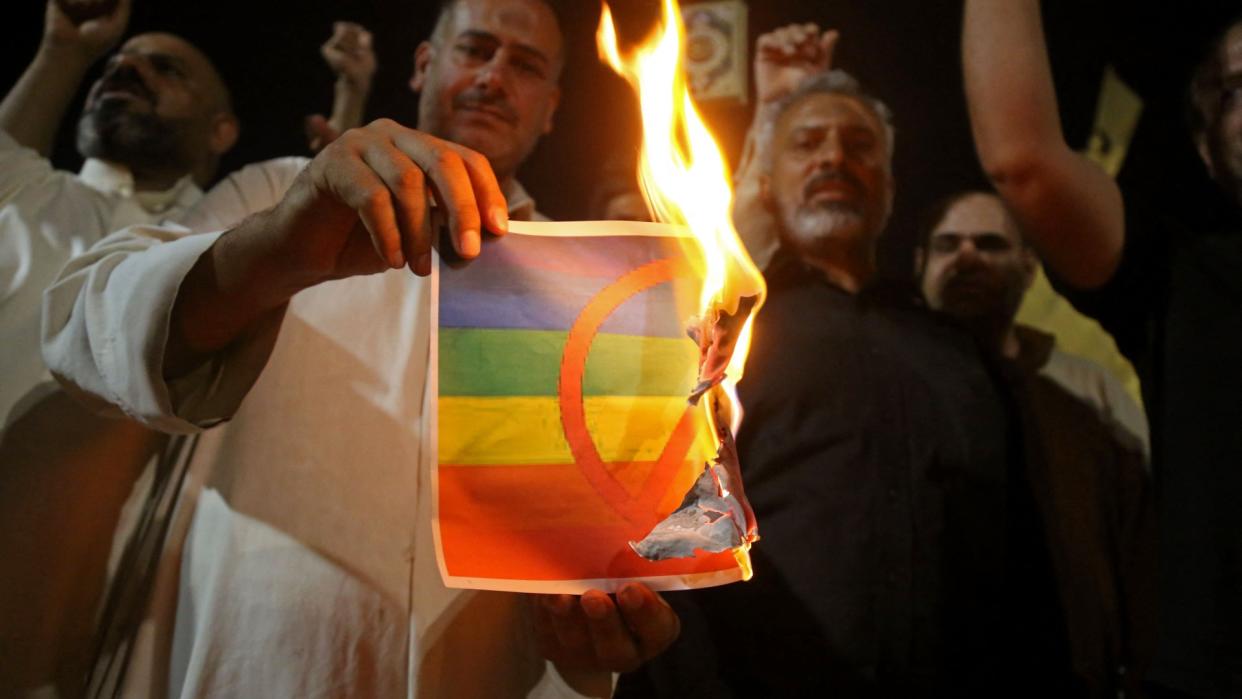LGBTQ+ rights in Iraq: how morality laws ramped up

Human rights groups have condemned a bill passed by Iraq's parliament that criminalises same-sex relationships, with jail terms of between 10 and 15 years.
According to a copy of the legislation seen by Reuters, the law aims to "protect Iraqi society from moral depravity and the calls for homosexuality that have overtaken the world".
Amnesty International's Iraq researcher Razaw Salihy said that Iraq had "effectively codified in law the discrimination and violence" that members of the LGBTQ+ community have "been subjected to with absolute impunity for years".
What is in the new law?
As well as a penalty of between 10 and 15 years in prison for same-sex relations, the Law on Combating Prostitution and Homosexuality mandates at least seven years in jail for anybody who promotes homosexuality or prostitution, and between one and three years for anyone who changes their "biological gender" or wilfully dresses in an effeminate manner.
Doctors who perform gender reassignment surgery, men who "intentionally" act like women and those who engage in "wife swapping" will also face prison terms under the new legislation, said the BBC.
Why has it been introduced now?
Iraq had been among the few Islamic nations that did not explicitly criminalise same-sex relations, but "loosely defined" morality clauses in its penal code have been used to "target" LGBTQ+ people, said The Independent.
The new legislation was backed by conservative Shia Muslim parties that form the largest coalition in Iraq's mainly Muslim parliament. It is "a significant step in combating sexual deviancy given the infiltration of unique cases contradicting Islamic and societal values", Amir al-Maamouri, an independent MP, told Shafaq News.
It is indeed "sweeping", said Pink News, although "less extreme than originally planned", after a clause in an earlier version of the bill that called for the death penalty for same-sex acts was removed due to opposition from the US and Europe.
What has the reaction been?
The amended legislation has sparked condemnation from human rights groups and the international community.
It is "dangerous and worrying", said UK Foreign Secretary David Cameron. A statement from the US State Department said the law "threatens those most at risk in Iraqi society" and "can be used to hamper free speech and expression and inhibit the operations of NGOs across Iraq". The law would also weaken Iraq's ability to diversify its economy and attract foreign investment, the department said.
Data collected in 2022, reported by Pink News, suggested that just 2% of Iraq's population support homosexuality, while 55% oppose it. Ordinary Iraqis interviewed on Sunday expressed "mixed views" on the new law, said The Associated Press.
What was the law before?
"Public perception and morality clauses in its penal code" mean that LGBTQ+ people have been "routinely targeted domestically and institutionally", said Pink News.
A 2022 report by Human Rights Watch said armed groups in Iraq were abducting, raping, torturing and killing lesbian, gay, bisexual and transgender people, and accused the Iraqi government of failing to hold perpetrators accountable.
The words "homosexual" and "gender" were banned in the media and on social media platforms in 2023. Officials claimed the move would safeguard societal values and maintain public order.
Over the past year, major Iraqi parties have "stepped up" criticism of LGBTQ+ rights, said Al Jazeera, "with rainbow flags frequently being burned in protests by both governing and opposition conservative Shia Muslim factions".
Renewed outbreaks of violence against Iraq's LGBTQ+ community have seen several people killed, including 28-year-old trans blogger Simsim, who was stabbed to death by unknown assailants in the city of Diwaniyah in February.
The new law "rubber-stamps" the country's "appalling record of rights violations", said Rasha Younes, deputy director of the LGBTQ+ rights programme at Human Rights Watch, marking "a serious blow to fundamental human rights".

